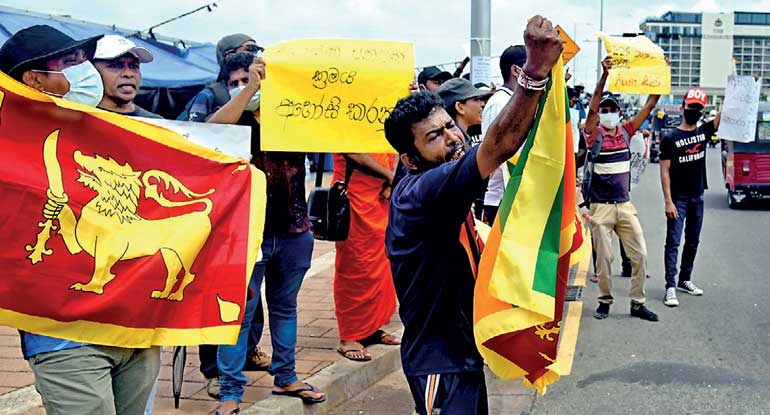Monday Feb 16, 2026
Monday Feb 16, 2026
Tuesday, 7 June 2022 03:12 - - {{hitsCtrl.values.hits}}

The ongoing protests representative of the discontent of the most constitutionally supreme PIS are continuing, much akin to the people’s grievances of the past, inordinately ignored by the system of governance and piling up unresolved, the root cause of the current crisis and the ongoing protests
 Abstract
Abstract
The article examines the extent to which the proposed 21st Amendment should address in remedying the lapses in the exercise of the delegated power of the most supreme People’s Inalienable Sovereignty (PIS), the composition of which is lucidly emphasised at the Constitution’s clause 3. It’s the power most vital to ensure “Good Governance”. But it’s surreptitiously forfeited with the delegation of exercise of the PIS’s power as per the Constitution’s clause 4.
The root cause defying the aims of all constitutional amendments enacted up to now, despite assuring their aim is to nurture good governance, eradicate corruption, and guarantee improvement of people’s wellbeing. It is attributable to a critical flaw in the Constitution arising from structural, capacity, and multidisciplinary knowhow deficiency, in particular non-inclusion of proven efficacious features of modern technology.
The aforesaid is the core driver of people’s discontent provoked by mounting people’s unaddressed grievances, most continuing unheeded, piling up to limits exceeding bearable threshold, frequently erupting to protests of varying intensity and duration.
The writer believes, the current civil uprising is a great opportunity, never to be missed to reform and address the systemic constitutional issues with 21 A.
Preamble
The Executive Presidency, which was enacted in 1977 has not proven any benefit to the nation but destruction in many forms over the past 45 years triggered in consequence of concentration of executive powers and made the position immune to any judicial proceedings. The style and leadership who occupied this position have taken the country in different directions harbouring, political interferences, corruption, state sponsored intermediation and terrorism, communal disharmony, leading to instability, dysfunctional government people uprising and civil wars.
The timing of the 21st Amendment to the Constitution connotes the belief that the amendment is a panacea for eradicating forever people’s discontent provoked by mounting people’s unaddressed grievances. Continuing unheeded piling up to limits exceeding bearable threshold, frequently erupting to protests of varying intensity and duration but never so intense and persistent like that currently ongoing. The objective of 21A to the Constitution, as understood by the general public, especially the protestors was to annul 20A and restore 19A with suitable amendments with proper checks and balances between the PM and the executive President, and most importantly to address the inalienable sovereignty of the people which was greatly eroded upon 20A.
Constitutional amendments – consideration and issues need to be addressed
It’s ironic to note despite these noble constitutional provisions and pledges and additionally, the amendments to the Constitution enacted on the claims of strengthening governance, eliminating corruption, for improving the wellbeing of the people – such as 19A for curtailing some executive powers vested in the Presidency, thereafter 20A to restore and reinforce the quashed power of the Presidency by 19A on the claims that 19A was a dismal failure that caused displacement of Government.
The ongoing protests representative of the discontent of the most constitutionally supreme PIS are continuing, much akin to the people’s grievances of the past, inordinately ignored by the system of governance and piling up unresolved, the root cause of the current crisis and the ongoing protests.
[1]The most serious aberrance of the Constitution is the non-discerned contradictory prescription of clause 3 which specifies: In the Republic of Sri Lanka sovereignty is in the People and is inalienable. Sovereignty includes the powers of government, fundamental rights and the franchise, clause 4 says, the Sovereignty of the People shall be exercised and enjoyed in the following manner:
(I) the legislative (II) the executive power and (III) the judicial power of the People as prescribed by Constitution’s Chapter 1 clauses 4a, 4b and 4c
Quoting reference to Jean-Jacques Rousseau’s Du Contrat Social, ou Principes du droit politique (1762), the Sovereignty, or will of the people, is inalienable, for the will cannot be transmitted; it is indivisible since it is essentially general; it is infallible and always right, determined and limited in its power by the common interest; it acts through laws
The two clauses 3 and 4 contradict the definition of “Inalienable Sovereignty” void of any real-time checks and balances, its reposed to the three supreme nodes of power wielding their authority disregarding their appointee the “Peoples Inalienable Sovereignty”. The subclauses of Chapter 1 4a, 4b and 4c indicate that the inalienable sovereignty has been transmitted and divided against the three organs as specified.
Additionally, whilst ratifying immutable republican principles of representative democracy assuring to all People, to preserve the core outcomes: Freedom, Equality, Justice, Fundamental Human Rights and the Independence of the Judiciary as the intangible heritage that guarantees the dignity and wellbeing of succeeding generations of the people of Sri Lanka and all the people of the world who come to share with those generations the effort of working for the creation and preservation of just and free society.
[2] The non-discerned fundamental lapse arising of [1] above, is the root cause for the public discontent exacerbating to unendurable limits, driven by incoherent disintegrated and uncoordinated anarchy’ as opposed to coherent integrated well-coordinated good governance
[3] The most harshly affected by this lapse is the People’s Inalienable Sovereignty, in reality the Apex of the Peoples Fundamental Right, that’s stifled and gagged during the tenure of the Parliament constituting the Representatives appointed by the mandate of the people but audaciously defying the confidence reposed in the Representatives
[4] Its evinced from repressed but steadily aggravating latent discontent that on exceeding endurable limits has now erupted to an unequivocal resonant voice of mass discontent clamouring for their deprived “Peoples Inalienable Sovereignty”
[5] To surmount inefficacies and afflictions of this lapse there shall be a People Centric Entity of Multidisciplinary Composition covering exhaustively all the defined core disciplines, imperative for the sturdy and resilient development of the wellbeing of the nation to monitor real time and remedy aberrances to sustain the key deliverables and productivity of each ministry and office of the President defined quantitatively qualitatively
5.1. The body shall be named the Peoples Inalienable Sovereignty Senate (PISS Council) and shall be elected by the people at the time of election of Parliamentary representatives from those of eminence, nominated by each of the said core disciplines. Its tenure of office should be such that it overlaps for minimal duration with the appointment of the new Parliament following election
5.2. Any member of the public person individually or collectively may apprise the PISS of any aberrant conduct of any entity bound by the Constitution
5.3. The institutions like COPE and Auditor General shall be responsible to or support the functioning of the entity
[6] To facilitate understanding with ease and meaningfully, the imperativeness of the aforesaid need and also the engagement of multidisciplinary knowhow, to advance the progress of any discipline, the analogy of part to whole such as the analogy of a modern umpiring system to the Judiciary envisioned by CJ USA, the more refined needs of deliverables of a driverless vehicle maintaining collision free course an ILS or space probe controlled to reach a distant target, will be explicated separately
Further notes
The statutory provision though seemingly a noble connotation, in reality is nothing but a rent seeking declaration concealing the preservation of the past and current aberrant exercise of people’s inalienable sovereignty. It is forced guilefully by the creator of the 21A to entrust the mandate of the People’s Right to the Constitution’s three supreme organs: void of any real-time checks and balances of the due deliverables conforming to the people’s defined expectations and tolerance.
To elucidate above, akin to the analogy of the Judiciary to a Modern umpiring system envisioned by Robertson the Chief Justice USA is the analogy of the exercise of the People’s mandate by the Constitution’s three supreme organs, viz: an analogy, if an uncontrolled air conditioning system or refrigerator, operate without control of temperature and humidity, affects its users to discomfort thereby defeating the very purpose of the two devices forcing its shut down by the user. Therefore, it is essential to facilitate real time monitoring to access the Constitution Council by the People/Communities. These interactions and communication channels are imperative to surmount the prevalent critical lapses of the system. This illustrates the desperate need and urgency of a functional unit akin to the 3rd umpire equipped with access to tools of modern technology for monitoring deliverables.
Conclusion
To reinforce the people’s sovereignty, it is essential to build a knowledge-based feedback mechanism within the proposed 21A, i.e. an independent umpiring system, thus empowering the public to express their grievances and to obtain a solution in a timely fashion without prolonged delays with no aberrant departure to people’s sovereignty. This requires timely monitoring and coordination between the three organs, executive, legislature and judiciary, and in the event, results are not forthcoming to refer to the umpiring system within the feedback mechanism loop thus preventing any breakdown and becoming a stalemate. The knowledge-based feedback mechanisms must be applied across all sectors, e.g. national economy, governance in transparent manner delivering the desired public good.
The inalienable sovereignty of the people has been eroded significantly as a result of 20A where the president has been given to exercise the people’s sovereignty at his will thus breaking down the balance between the three organs and skewing of power towards the executive. This was the root cause of public anger and the uprising and displeasure of the current governance framework; all the others were secondary issues economically triggered by the non-execution of people’s will.
It is believed that the current opportunity should never be missed to remove all the ambiguities and contradictions, especially restoring the people’s sovereignty and inalienable rights that have been systematically eroded and abused by the politicians. With regard to the constitutional council and its composition, they have to be balanced, fair and reasonable, and the role of the council as a unit and the roles of the individual members need to be well defined thus preventing state interference.
In addition, a proper flow chart needs to be drawn showing the interaction and accountabilities between the three main organs, Judiciary, Executive and Legislator with the constitutional council, an umpiring system as mentioned with illustrations herein. It is also important to bring IT tools and integrated information systems, currently lacking, in improving the efficiency and productivity across the three main organs, intra and inter sectors, and establishing coherent integrated coordination of activities.
In the event 21A disregard to establish an effective knowledge based multidisciplinary structure to function as an independent umpire, safeguarding the People’s Inalienable Sovereignty, the rudiments of the constitution, the 21A proposed is no exception in reality and be more ineffective and liable for multiple interpretation of clauses 3 and 4 for taking advantage positions of those who seek refuge.
Finally, it is the fervent belief of all citizens of Sri Lanka to abolish the executive presidency from the Constitution and restore a parliamentary system of democracy where the Prime Minister and the Cabinet is solely responsible to the Parliament with establishment of independent councils/commissions, knowledge based multidisciplinary viz: constitutional council performing the duties of umpires.
I wish to conclude with the following famous quote of Eleanor Roosevelt for the readers to categorise our 225 politicians into the three groups: “Great minds discuss ideas; average minds discuss events and small minds discuss people”.
(The writer compiled this paper with the input of a widely read independent thinker, a Subject Matter Expert and who pioneered the liberalisation of the telecom sector and Telecom Regulatory Commission of Sri Lanka.)